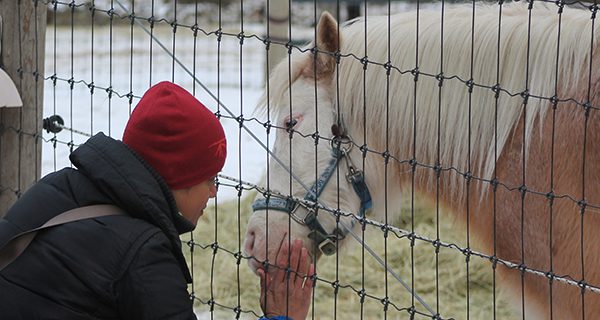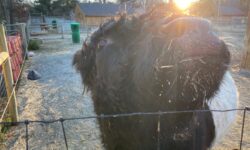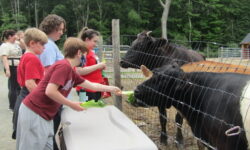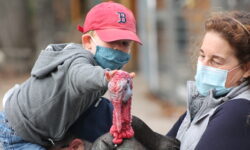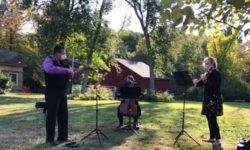[ccfic caption-text format="plaintext"]
By James Kinneen
Hometown Weekly Reporter
On Saturday afternoon, Unity Farm Sanctuary opened its doors for a winter solstice celebration. With tours of the facility, free hot cocoa, cookies and cider, the farm (and farmhouse, built in 1833) were extremely inviting and pleasant.
Unfortunately, some of the facts that the farm has to deal with on a daily basis are far less so.
Sanctuary worker Marla Andrews did a phenomenal job at simultaneously entertaining a crowd that included many children, while having to deliver some harsh truths about the way we treat farm animals and pets in America. She talked about how the cows on the sanctuary are her “grass puppies” because they act just like dogs - albeit at around 1,000 pounds. She told fun stories about how the sanctuary’s turkeys have been caught chasing the wild turkeys around the property’s woods, and how there are a couple of “unintended hybrids” kicking around the sanctuary as a result. And, the former MSPCA employee joked about how at first, she was thrown off by the alpacas being on the farm, because “Old MacDonald doesn’t have any alpacas in it.”
But while Marla made sure everyone greatly enjoyed the tour, she also educated the crowd about just why these animals needed to be saved by the sanctuary. For example, there were lambs that couldn’t nurse from a farm that raises sheepdogs. Without the sanctuary, they were headed to the slaughterhouse, because there was no way a sheepdog farmer was going to bottle-feed a baby lamb. The sanctuary has also saved cows that couldn’t make milk, genetically blind horses, and a cow that made headlines by hopping off a truck in Hopkinton this year, on its way to the slaughterhouse.
Andrews noted that when she gives the tours, she realizes the vast divide between what people think happens to animals, versus what actually happens to animals.
“I think that people don’t realize the plight of animals, everyday animals. People think male cows, male calves, have a life somewhere living on free and open green grass, when they don’t. They’re sent to slaughter auction very shortly after birth. I also think they don’t realize that all of our animals are representative of much bigger problems, so when we introduce and try to educate them on why the animals are here, we get people starting to think of what animals are worth to us. Do they need to perform for us? Do they need to perform a task for us? Do we need to be able to raise them for meat to be valuable, or can they just live and be freely? All of our animals can do that. I think people are taken aback when they stop and think about how these animals got here, and the much larger problem as a whole.”
While the traditional animals that we know are slaughtered for meat live on the farm, the horses also represent a teaching tool for the sanctuary. While we often think about underperforming racehorses being sent to the “glue factory," many horses - even beloved pets - are sent off to be slaughtered for food.
“When it comes to horses, many horses end up at what we call auction in America, and a lot of people, most of the world, doesn’t know that. They think that horses live out their lives somewhere, but for whatever reason, if they’re not bringing in money as lesson ponies or if they develop health problems as horses, or if they’re just living beyond their best years and can’t do as many lessons, a lot of them end up at auction, and end up as food in either Canada or Mexico. So, they’re sent to slaughter, which is a horrific ending for pets, animals that are companion animals, and people don’t realize that about horses. All of our equines are here, and they're fortunate to be here.”
While there are no especially rare animals at the sanctuary, you will see something you’ve likely never seen before there: old farm animals.
“I think people are kind of traumatized in some way when they realize they don’t have the truth of the story. We’re raised to believe that animals on farms are happy and live to be old. It’s unusual to see a cow that’s 20 or a pig that’s 15. In the food production [industry] and beyond, we don’t see animals growing old, and this is hopefully a place where they can do that.”
The tour, the cookies and the event as a whole were a very fun time for all the families and individuals that attended.
While there’s no especially pleasant way to find out the truth about our relationship with farm animals, on Saturday afternoon, Unity Farm Sanctuary came as close as it could.





